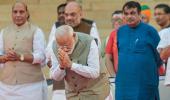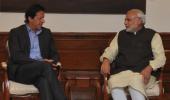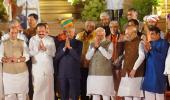'There was no need for opting for such an elaborately and expensively organised spectacle,' says B S Raghavan, the distinguished civil servant.
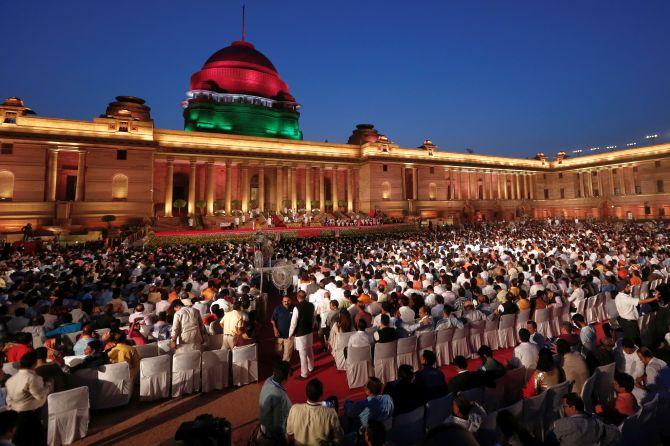
There can be no doubt that the format of the function for the swearing in by President Ram Nath Kovind of Prime Minister Narendra Damodardas Modi and his team of ministers had been jointly devised by him and Amit Anilchandra Shah.
At first sight, there was nothing in the way the function was organised that would have struck a discordant note in the thinking of the run-of-the-mill, conventionally oriented observers.
But on deeper reflection, one feels uneasy at least on four major counts.
First, the scale and magnitude, even if one ignores the cost which must have run into crores of rupees.
As per various published reports, the number of those invited was given out, with a distinct sense of awe, as 8,000. Of these, barring the few hundreds in the front rows, all the rest, seated at a considerable distance, would not have been able to make out clearly even the faces of those who were being sworn in, nor savour the excitement of participation.
In an age when information and communications technologies give ringside seat to everyone to watch any event in any part of the world at close quarters from the comfort of one's home, there was no need for opting for such an elaborately and expensively organised spectacle, except perhaps to make the different categories of invitees from different walks of life bask for the nonce in the glow of having been honoured by the recognition of the powers-that-be.
Indian politicians are not unique in seeking to revel in such extravaganzas. The swearing-in of the newly elected US presidents is also marked by a huge gathering on the Capitol of Washington, but it is made up of the general public, pitching in on their own, the invitations themselves being limited to a thousand or less. The bash by the President, following the ceremony, however, costs hundreds of millions of dollars.
In any case, one hoped that Modi would not fall for the temptation of staging such ostentatious displays which are totally out of sync with the India of Mahatma Gandhi, the icon of simplicity and austerity, whose ideals the political class professes to revere.
Gandhi wanted the viceroy's and governors's palatial mansions to be converted into hospitals and educational institutions and the ministers, as servants of the people, to live in humble dwellings, and Modi too has been describing himself and his ministers as such.
It will be good to initiate a tradition of holding the swearing-in in one of the halls of the Rashtrapati Bhavan before a small audience confined to governors, chief ministers and leaders of political parties.
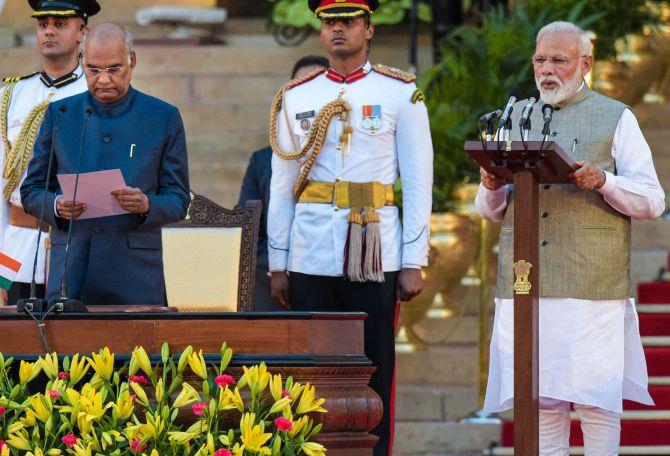
Next, I also feel uneasy about the rationale of selection of special invitees. The heads of States/governments of Bangladesh, Myanmar, Sri Lanka, Thailand, Nepal and Bhutan, had been invited on the ground that they are member-countries of BIMSTEC (Bay of Bengal Initiative for Multi-Sectoral Technical and Economic Cooperation).
Of course, a host country has every right to have the invitees of its choice for State functions like this and there can certainly be no objection to BITMSTEC countries and Mauritius and Kyrgyzstan being treated as special invitees.
The rub is when the extending of the invitations is said to be in pursuit of India's Neighbourhood First policy.
Neighbourhood First is a laudable goal, for a congenial neighbourhood is the essential pre-requisite for what is close to the prime minister's heart -- 'Sab ka vikas.' However, it is relations with China and Pakistan, and not so much with any of the BIMSTEC counties, nor Mauritius and Kyrgyzstan, that will play a decisive role in creating such a congenial environment.
From that standpoint, China and Pakistan deserved to be considered the foremost among India's neighbours and any gesture that would have generated friendly vibes with them would have been worthwhile.
It is unlikely that President Xi Jinping of China would have found it possible to attend, but Prime Minister Imran Khan of Pakistan would have in all probability attended and with pleasure.
It would have helped in the buildup of political capital which would have stood India in good stead.
The third incongruous element, to my mind, is the inclusion of Odisha MP Pratap Chandra Sarangi as the minister of state, who has also been given the rather demanding portfolios of micro, small and medium enterprises, animal husbandry, dairying and fisheries.
One is all admiration for the great services Sarangi has rendered to the poor and the under-privileged and his efforts to lift them out of the mire of deprivation and neglect. He should have been left to continue with what he has so selflessly dedicated himself for and what he is best at, instead of uprooting him and bringing him to Delhi in what to him would be a bewilderingly unfamiliar environment.
Thereby, while, on the one hand, he is lost to the poor and downtrodden, he is unlikely to prove himself to be a great gain to the government.
Caught in the crippling coils of rules and procedures in the labyrinthine catacombs of the central secretariat and having to deal with bureaucratic zombies mouthing a strange language, he may soon end up as a misfit in the corridors of power.

Appointment of S Jaishankar as a minister with Cabinet rank has the merit of being a surprise. Modi, apparently, found enough justification to catapult an erstwhile bureaucrat and a greenhorn in politics to Cabinet rank over the heads of tried and tested political associates of the ruling dispensation.
The problem with bureaucrats in ministerial berths is that very often they are past their prime when inducted, and after a more than three decades long spell of subordination and subservience in the rarefied atmosphere of bureaucracy, their capacity to take bold and independent decisions is apt to get blunted for no fault of theirs.
The problem gets compounded if the bureaucrat-made-minister gets charge of a ministry within the confines of which he has spent all his career. He would have got set in his thinking, and a fresh or open mind may not come easy to him.
To what extent Jaishankar would overcome these disabilities and be capable of out-of-the-box thinking leading to the formulation and effective implementation of policies to meet the formidable challenges of the 21st century remains to be seen.
The only parallels coming to mind are those of C D Deshmukh of the Indian Civil Service and Manmohan Singh of the Indian Economic Service. Deshmukh's tenure was unremarkable and he eased himself out on some flimsy pretext, while Manmohan Singh did what he did as the finance minister purely because of the solid and strong political backing provided by P V Narasimha Rao. As prime minister he was a disaster. Let us hope Jaishankar will prove an exception.
B S Raghavan is a former member of the Indian Administrative Service, US Congressional Fellow and Policy Adviser to the UN (FAO). He has held leadership positions in India's state and central governments handling issues pertaining to political policy planning, national security, intelligence, energy and food security.
